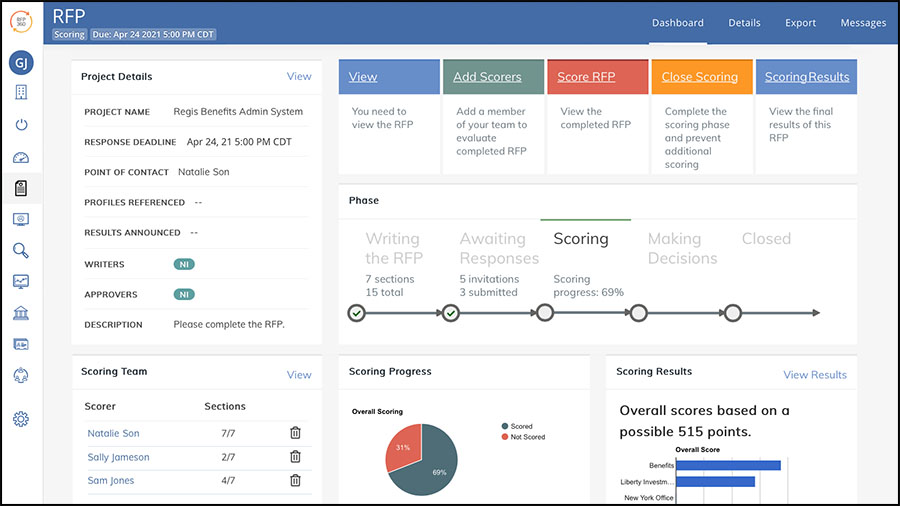As anyone in procurement can tell you, there’s a lot more to successful sourcing than simply sending out an RFP. Indeed, gathering information from potential vendors often requires a wide array of complex requests and questionnaires. This process, request management — the collection of valuable insights from third-party vendors — is crucial for procurement managers.
This blog will explore request management. To begin, I’ll share how request management fits into procurement. Next, I’ll provide an overview of the processes included when we talk about request management. Finally, I’ll share some tools and resources to improve your approach to request management.
- The roll of request management in procurement
- Sourcing processes included in request management
- Tools and resources for request management
The role of request management in procurement
Unfortunately, in some businesses, the procurement department is viewed as a bunch of request for proposal paper pushers. This misconception is a symptom of antiquated processes, bureaucratic procurement policies and a simple lack of understanding. Consequently, as procurement teams become more strategic and integral to the business, the RFP, and all procurement requests, are in desperate need of some good internal PR.
Indeed, the RFP process largely gets a bad wrap. Despite grumbles from various corners of the internet that the RFP should die, it’s still the cornerstone of objective vendor selection. Not only that, but it’s the foundation for every other type of vendor information request.
When the need for different types of third-party information arose, the basic question and answer format of the RFP adapted to fill the need. Consequently, if you’re in procurement, you’re undoubtedly familiar with these various information-gathering documents. Between the RFP, the RFI, two types of RFQs, security questionnaires, vendor risk assessments and due diligence questionnaires (more on these below), you probably spend more time than you realize on vendor information requests.
The importance of thorough and thoughtful third-party information gathering cannot be understated. Accordingly, the term ‘request management’ helps to appreciate the skill it requires to effectively create, administer, evaluate and facilitate these complex request processes.
What is request management?
Request management is the procurement process of using various questionnaires to gather important vendor information and facilitate strategic sourcing, vendor evaluation, risk management and due diligence.
Elevating the request management process
Request management has a broad impact on your business and deserves more credit than it usually gets. Conveying the value of request management to your business starts by reframing the way you think and talk about the process.
Ensuring value-driven partnerships
Challenge the idea that procurement is a roadblock. With the rise of strategic sourcing, procurement teams are more focused than ever on delivering the complete package when it comes to selecting vendors to become partners. Indeed, with the big picture and end goals in mind, it’s wise to engage stakeholders in the process and share the insights and additional value your sourcing process uncovers.
Reducing risk
Risk is inherent in any third-party relationship — a fact that most stakeholders tend to be blissfully unaware of. Fortunately, the detail of your RFx process paired with periodic vendor risk assessments significantly reduces the likelihood and severity of potential threats that may be introduced by a vendor. In the worst case scenario, these risks have wide-reaching consequences including loss of profit, reputational damage and potential litigation.
Delivering data
The next time you issue any kind of third-party information request, don’t just think of the response content as a set of answers, think of it as data — because that’s exactly what it is. Indeed, as procurement technology advances, sourcing software increasingly leverages request management automation, machine learning and artificial intelligence. All of these tools are designed to improve efficiency and effectiveness. And, data from vendor information requests fuels them.
Sourcing processes included in request management
Throughout the course of the vendor lifecycle, you’ll need to gather a lot of information for different purposes. Luckily, there’s an information request for almost every possible need.
Request for proposal
A request for proposal, often abbreviated as RFP, asks questions to help stakeholders decide which vendor to engage for a particular project.
Best for: Complex strategic sourcing projects, comparing vendors, verifying capabilities
Issued when: You’re ready to enter a contract or make a purchase
Learn more: Discover how to write RFPs and see examples
Request for information
The request for information, sometimes shortened to RFI, is an exploratory questionnaire. It poses a problem and challenges vendors to build creative solutions.
Best for: Planning, verifying project viability, exploring the market
Issued when: You need to conduct research and gather general information
Learn more: See RFI best practices, templates and examples
Request for quotation
A request for quotation, or RFQ, seeks to find the lowest price for a specific good or service. Accordingly, the questions focus on cost and budget.
Best for: Clear cut projects, bargain shopping
Issued when: All vendor offerings are of acceptable quality and you know exactly what you need
Learn more: Discover sample request for quotation templates, a how-to guide and more
Not sure which RFx is right for your project? Download this handy infographic for quick reference.
Request for qualifications
The second RFQ on our list, the request for qualifications is a questionnaire that focuses on experience, past successful projects and customer references.
Best for: Large-scale projects with complex requirements, finding expertise
Issued when: You need a trustworthy vendor with impeccable credentials
Learn more: Explore how to use an RFQ as well as helpful examples
Vendor risk assessment
A vendor risk assessment covers any factors that could pose a threat to the business or partnership. For example, a risk assessment may cover data security, HR policies, legal and financial records or customer references, just to name a few.
Best for: Regular risk identification, regulatory compliance
Issued when: Before executing a contract with a potential new vendor and periodically for existing vendors
Learn more: See how to use a vendor risk assessment and download a template
Due diligence questionnaire
Before any investment, merger or acquisition a due diligence questionnaire is issued. The questionnaire seeks information to validate the transaction.
Best for: Large transactions, verifying financial stability
Issued when: You need to uncover any potential pitfalls of completing a transaction
Learn more: Check out nine helpful due diligence questionnaire examples
Tools and resources for request management
If you’re like most procurement professionals, you’ve been managing requests for your entire career. However, you may not be aware of all the tools and resources available to you. Start here to equip yourself with more request management knowledge.
Data: Request management survey and research
Currently, there is very little quantitative data about request management. Fortunately, Art of Procurement is actively seeking participants for their request management survey. At the conclusion of the survey, a report of the results will provide a benchmark for request management in the future. Participants in the survey will receive advanced access to the results.
Podcast: Misused and misunderstood: Reclaim the power of the RFP w/ Dave Hulsen
Why does the RFP get so much hate? Explore how the overuse of the RFP process led to request management burn out — and how we can fix it in this podcast. Featuring guest Dave Hulsen, the discussion covers many request management topics from a sourcing perspective.
RFP management software: RFP360
I’d be remiss if I didn’t include RFP software, one of the most effective ways to transform and improve your request management processes. When it comes to asking questions, evaluating answers and delivering data from third parties, a digital RFP management system centralizes the entire process. In addition to improving request management for procurement teams, sourcing software also enables a better vendor experience, making it easier for them to respond.

RFx templates: Resource library
No matter what information you need to gather from a vendor, you’re not the first to ask for it. Luckily templates make it easy to get what you need without starting from scratch. Explore these template resources to add to your RFP toolkit.
Ultimately, it’s time for you and your procurement team to be more vocal about value you add to your business. Creating, facilitating and managing complex information requests is challenging, but you make it look easy. With a new frame of mind and a little time, you can elevate your request management process to deliver quantifiable value to your entire business.



